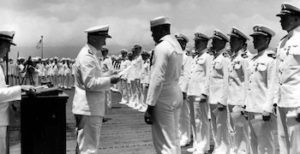
Dorie Miller receiving commendation
On this date from 1941, we recall the Japanese attack on Pearl Harbor with ten short Black facts that occurred during or after the incident.
1. Doris Miller was a mess attendant on the U.S.S. West Virginia when the Japanese attacked Pearl Harbor on December 7th of, 1941. Though Miller served his time as a cook, his bravery aided fellow wounded soldiers. Miller carried his shipmates to safety while Japanese bombs killed hundreds of soldiers on board. Miller also operated a 50-caliber anti-aircraft machine gun until it ran out of ammunition, and he had to abandon ship. The military awarded his bravery with the Naval Cross.
2. The first issues of Black newspapers after Pearl Harbor ran the headlines “Mr. President, Count on Us” and “The Black Tenth is Ready.”
3. Joe Louis promised prize money from his next two fights to the Army and Navy relief funds.
4. Doc Clayton recorded the revenge song “Pearl Harbor Blues,” damning the Japanese for their attack on Pearl Harbor. “Even a rattlesnake won’t bite you in your back,” Clayton sang about those “ungrateful” Imperial Japanese pilots.
5. Josh White sang the tune “Are You Ready?” promising Americans that any Japanese soldier would “batter till his head gets flatter.”
6. Edgar G. Brown, director of the National Negro Council, told President Roosevelt that all Black Americans pledged 100 percent loyalty to the United States.
7. The Southern Negro Youth Congress raised money for defense bonds, sponsored an Army Welfare Committee to establish a USO Center for Negroes, and created its Youth for Victory Committee.
8. Dr. Charles Drew urged that Americans, “whether black or white, need to get on with the winning of the war,” despite Drew’s disappointment at the needless and dangerous segregation of white and black blood supplies.
9. Richard Wright, one of America’s greatest writers, offered his literary services to the government for “the national democratic cause.”
10. The Federal Bureau of Investigation, known for spying on and plotting against Black Civil Rights leaders, officially concluded that “despite pockets of cynicism, Blacks strongly supported, and desired to be part of, the war effort.”
National Parks Service,
U.S. Department of The Interior,
National Historic Landmarks Program Home Front Study